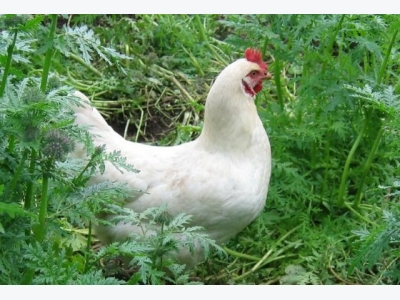Project to prevent erysipelas in organic poultry

Danish scientists have announced a new project that aims to provide novel information that will enable scientifically based guidelines to prevent future erysipelas outbreaks in both organic poultry and pig production.
Photo Aarhus University
The poultry and pig initiative is called EryPoP, as is communicated in a press release by Aarhus University, Denmark.
Erysipelas is a severe infectious disease caused by the bacterium Erysipelothrix rhusiopathiae. The disease is well-known, but basic knowledge particularly on the infection in chickens, is lacking.
Changes in regulations for poultry production
Following the change in housing for laying hens in Europe, erysipelas has become an emerging disease in several countries with outbreaks of high mortality in layer flocks in indoor aviaries and free-range/organic production.
Erysipelas is a well-known acute disease in pigs and a suspected cause of arthritis and considerable economic losses in organic pigs. Erysipelas is difficult to prevent in the growing sector of animal friendly production systems for pigs and poultry. Moreover, E. rhusiopathiae-infections constitute an occupational hazard for humans (zoonosis).
Vital basic knowledge is lacking
Although a well-known disease, vital basic knowledge particularly on the infection in chickens, is lacking.
Hence, in this project (EryPoP) the epidemiology, infection dynamics and immunity development in poultry and pigs will be addressed in the field and by experimental infections through a multi-disciplinary and transnational approach and cooperation.
The project has 5 main subtasks:
- To define transmission routes of E. rhusiopathiae by use of molecular epidemiology;
- To identify risk factors for outbreaks;
- To define the role of wild boars as potential reservoirs and sources of infection;
- To establish an assay to detect antibodies to E. rhusiopathiae in chickens;
- To study the pathogenesis and immune responses to E. rhusiopathiae infections in chickens.
Samples and metadata for analysis will be collected from poultry, domestic pigs and wild boars in Sweden and Italy.
Model for experimental infections
A model for experimental infections in chickens will be established and used in studies of chicken immune responses to E. rhusiopathiae. These studies will provide information that will be vital in development of diagnostic methods and improvement of future prophylactic measures such as vaccines.
Taken together, EryPoP will provide novel information that will enable scientifically based guidelines on prophylactic measures to prevent future erysipelas outbreaks and secure animal welfare in the growing animal friendly poultry and pig production.
Có thể bạn quan tâm
 Impact on hen bone integrity in cage-free environments
Impact on hen bone integrity in cage-free environments Dr Lay also mentions that the environmental complexity can create opportunities for the hens to express behaviours that may be detrimental to their welfare
 Parasites on chickens: backyard v commercial
Parasites on chickens: backyard v commercial Researchers compared the number of parasites found on commercial chicken flocks with those found on backyard flocks. But which chicken was the itchiest?
 Old bird diseases occur more among free-range hens
Old bird diseases occur more among free-range hens Over the last two decades old bird diseases, such as Coryza, Blackhead and Pasteurelle multocida increasingly reared their ugly heads among free-range hens